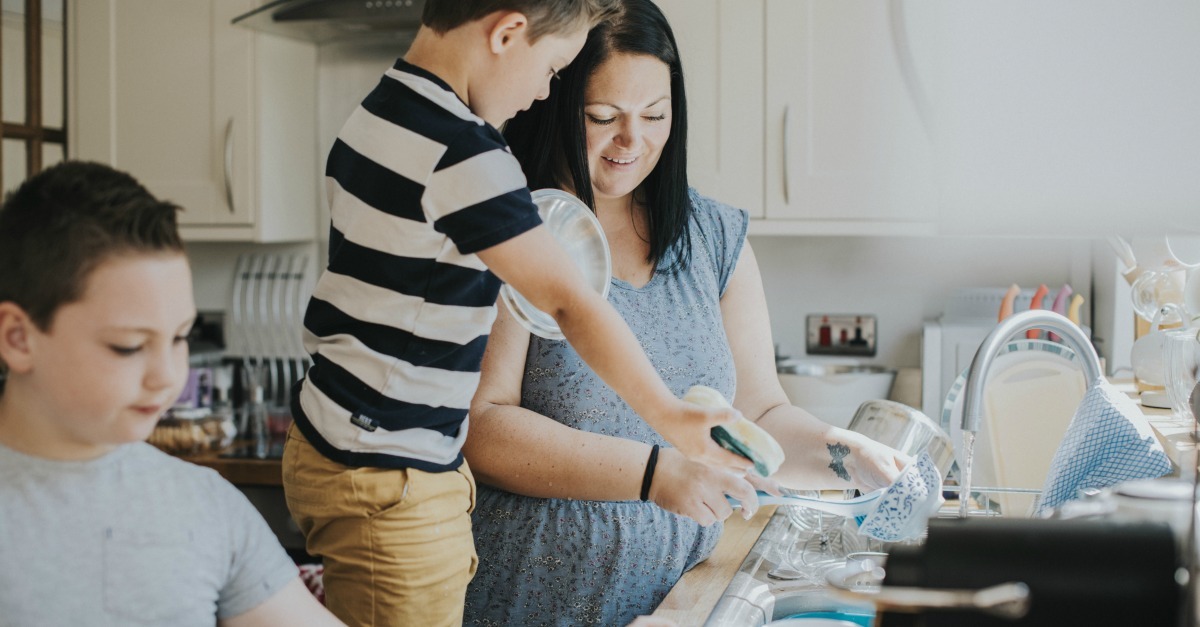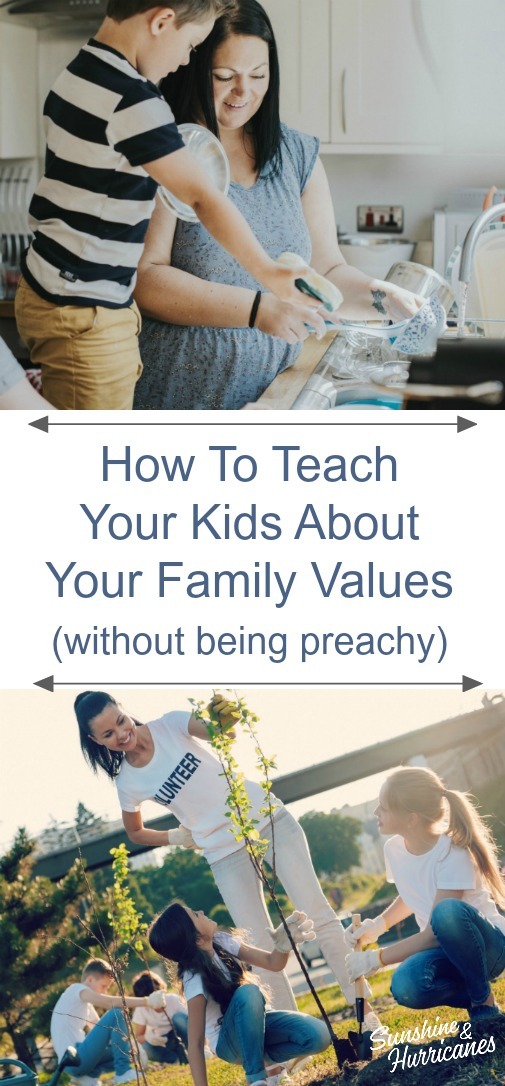
It’s a dilemma. You want our kids to grow up to be good people. You want them to be kind and respectful. You want them to behave honestly and with integrity. You want them to be good citizens. These are all a given. But on top of this, you also want to pass on your unique family values onto our kids.
You may be a family that devotes a significant amount of time to serving others. You may be a family that appreciates nature and you love to hike and bike and go camping. Perhaps work ethic is extremely important and you out an emphasis on household chores and making sure your kids really understand the worth of a dollar.
Who knows, your family may be all of these things and so much more.
No matter what values define your family, more than anything you want your kids to share these values.
But how do you get them there? Of course you don’t want to preach; getting all high and mighty doesn’t feel sincere, and it’s pretty much guaranteed to make kids shut down.
Plus, your goal shouldn’t be to impose a certain set of values on your kids, but to help them develop their own values. It is possible that your kids won’t adopt every value you want to pass onto them, but you can certainly help them build on a solid foundation.
Here are the best ways to pass on your family values to your children.
Live What You Teach
Step One is obvious, but it still needs to be said: Live your values (at least most of the time).
Most of what kids learn about values they learn from watching their parents in action. If they see you being mean to someone or overhear that you’ve cheated on our taxes, they learn that behavior is acceptable.
“Practice what you preach” is trite…but it’s true.
Values as Competing Goods
Beyond role-modeling, there’s talking. It helps to have a framework for the conversation. “Values” are things that matter to us, that we feel are important and right; they guide the decisions we make.
Values usually aren’t absolute. Often, two good things compete with each other, so we’re forced to think about what we value more and how we balance values in a given situation. There are lots of examples in your own life and in your kids’ lives: whether to prioritize sleep or talking with friends; whether to be more kind or more honest in a difficult situation; when to give your energy generously and when to take care of yourself, and so on.
Often this boils down to when to put self first and what we owe others. The answer is usually somewhere between the two extremes.
The Impact on Others
Values matter because they offset our sometimes selfish impulses and smooth our interactions with other people. Things like kindness, honesty, responsibility, duty, compassion, respect, and fairness make the world a better place.
You probably began talking about the impact of choices on other people when your kids were toddlers: “Take turns,” “Don’t hit; hitting hurts,” “It’s not fair to take a toy from another child.” That’s the foundation of teaching values.
Now that your kids are older, situations are more complicated. Fortunately, so are their brains.
Help your kids think through the impact of behavior on other people. Use situations that come up in their own lives, with other people they know, or in the news or a movie. What are the practical consequences of various options for the people involved? What are the emotional consequences, for everyone concerned?
Discuss, Don’t Dictate
If your kids are receptive, use an occasional dinnertime or drive to explore choices and values. Choose themes they can relate to—something related to something they’ve heard about at school, or a celebrity they admire.
Present a scenario and ask your kids what elements they think are involved. What are the arguments for each possible course of action? Who would be benefited or harmed by each option? What do they think is right? Which values do they think are most important in this situation, and why? What are the tradeoffs?
The thoughtfulness of their answers may surprise you.
Once they’ve taken a stab at it, add any angles they may have missed. Ask leading “what about ___?” questions to get them thinking.
Then (and only then) weigh in with your opinion. Say why you value certain things. Explain your reasoning, how you emphasize certain values over others in this situation. You don’t have to have this all worked out perfectly; what’s important is letting kids hear your thought process.
Share Your Own Dilemmas
A great way to draw teens into a discussion of ethics and values is asking their opinion on a situation you’re facing. (The complete opposite of preaching, right?)
Using a real-life example illustrates how complex ethical decisions can be when competing values are involved. It also humanizes you. You’re the parent, but you don’t always have all the answers, and that’s okay. Your openness to a conversation where you don’t know everything—where you’re being vulnerable—makes you more approachable when your teens have an ethical problems of their own.
State Your Hopes, Not Demands
Sometimes talking about values isn’t a conversation, but a statement. Commands don’t work (“You have to ___”, “Don’t you ever ___”); they just make teens tune you out.
Expressing your wishes, though, is surprisingly effective. You can make a point about what’s important to you, what you value, at the same time you tacitly acknowledge that you can’t control your teen’s choices.
For instance:
“I hope you wouldn’t put someone else down to make yourself look better.”
“I hope you’ll never take advantage of someone smaller or weaker just because you think you can get away with it.”
“I hope you’ll be honest, even when that means you don’t get what you want.”
“I hope when you have to say no to someone or break up with someone, you’ll do your best to be kind.”
“I hope you’ll be the kind of person who always considers how choices will affect other people.”
With all of this, your goal is not really to tell them what’s right and wrong. That’s part of it, but the larger goal is helping them develop skills for moral reasoning. Give them tools for thinking through the ethical implications of their decisions when you’re not around.
Plant the seeds and you may be surprised to see how many of your family values How To Talk With Your Kids About Your Family’s Values.
This post was contributed by Jill Whitney, LMFT. She is the mom of two twenty-somethings and a licensed marriage and family therapist in Connecticut. In addition to her clinical work, she conducts workshops on talking about sexuality, writes at KeepTheTalkGoing.com, and has been quoted in dozens of articles on relationships and sexuality. She’s passionate about improving communication about sexuality, especially between parents and kids.
The Importance of Chores for Children (Printable Chore Chart)
Grace Instead of Judgement: Explaining Why Different Families Make Different Choices







[…] are a million studies that show family dinner time is important. It fosters communication. It keeps kids off drugs and alcohol. It ensures the kids do better in […]